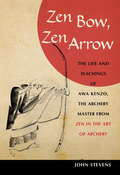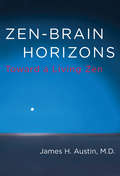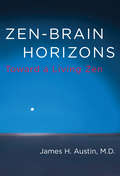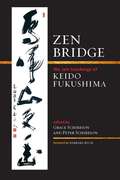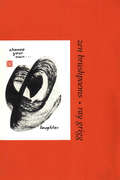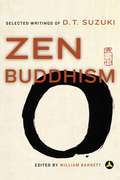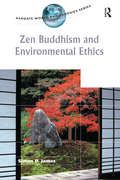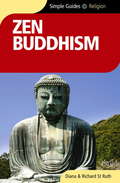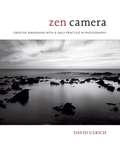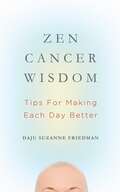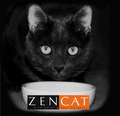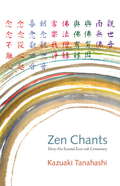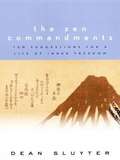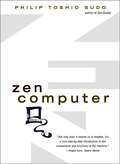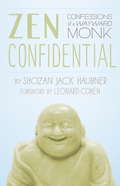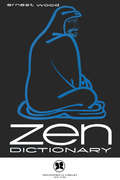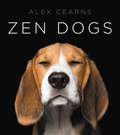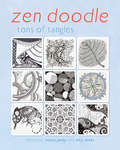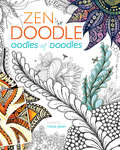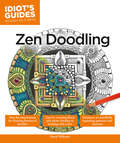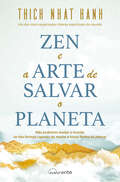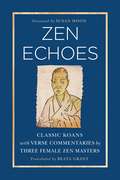- Table View
- List View
Zen Bow, Zen Arrow: The Life and Teachings of Awa Kenzo, the Archery Master from Zen in the Art of A rchery
by John StevensHere are the inspirational life and teachings of Awa Kenzo (1880-1939), the Zen and kyudo (archery) master who gained worldwide renown after the publication of Eugen Herrigel's cult classic Zen in the Art of Archery in 1953. Kenzo lived and taught at a pivotal time in Japan's history, when martial arts were practiced primarily for self-cultivation, and his wise and penetrating instructions for practice (and life)--including aphorisms, poetry, instructional lists, and calligraphy--are infused with the spirit of Zen. Kenzo uses the metaphor of the bow and arrow to challenge the practitioner to look deeply into his or her own true nature.
Zen-Brain Horizons: Toward a Living Zen (The MIT Press)
by Austin James H.In Zen-Brain Horizons, James Austin draws on his decades of experience as a neurologist and Zen practitioner to clarify the benefits of meditative training. Austin integrates classical Buddhist literature with modern brain research, exploring the horizons of a living, neural Zen. When viewed in the light of today, the timeless wisdom of some Zen masters seems almost to have anticipated recent research in the neurosciences. The keen attentiveness and awareness that we cultivate during meditative practices becomes the leading edge of our subsequent mental processing. Austin explains how our covert, involuntary functions can make crucial contributions to the subtle ways we learn, intuit, and engage in creative activities. Austin begins by looking back at ancient Buddhist narratives. He then weaves together the major themes of self, attention, emotion, language, and insight. He goes on to examine Zen and psychology as cultural developments, including recent information about how a clear, calm awareness can change the meditating brain. He considers the pathways through which intuitions develop on their way to becoming realized, exploring the phenomena of the spontaneous color imagery that arises during meditation. Looking out even further into the future, Austin discusses the universal themes of creativity, happiness, openness, and selflessness. Along the way, he bows in homage to William James, explores "Buddhist Botany" and "Avian Zen," demonstrates why living Zen means much more than sitting quietly indoors on a cushion, and provides simplified advice that helps guide readers to the most important points.
Zen-Brain Horizons: Toward a Living Zen (The\mit Press Ser.)
by James H. AustinA neurologist and Zen practitioner clarifies the benefits of meditative training, drawing on classical Buddhist literature and modern brain research.In Zen-Brain Horizons, James Austin draws on his decades of experience as a neurologist and Zen practitioner to clarify the benefits of meditative training. Austin integrates classical Buddhist literature with modern brain research, exploring the horizons of a living, neural Zen. When viewed in the light of today, the timeless wisdom of some Zen masters seems almost to have anticipated recent research in the neurosciences. The keen attentiveness and awareness that we cultivate during meditative practices becomes the leading edge of our subsequent mental processing. Austin explains how our covert, involuntary functions can make crucial contributions to the subtle ways we learn, intuit, and engage in creative activities. He demonstrates why living Zen means much more than sitting quietly indoors on a cushion, and provides simplified advice that helps guide readers to the most important points.
Zen Bridge: The Zen Teachings of Keido Fukushima
by Barbara Ruch Grace Schireson Keido Fukushima Peter SchiresonA funny, poignant, and illuminating masterclass on Zen philosophy and practice from a beloved teacher.Zen Bridge collects Dharma talks given by the Zen master Keido Fukushima Roshi. Fukushima Roshi's anecdotes on his own training are humble, hilarious, and full of wisdom. His reflections on classical teachings intermingle with personal stories, allowing them to be accessible to all readers while at the same time transcendent. The power and authenticity of this true Zen master shines through in his words. This book includes black and white illustrations of basic sitting and hand posture for meditation as well as selections of Fukushima Roshi's calligraphy.
Zen Brushpoems
by Ray GriggZen Brushpoems connects the creative insights of Haiku-like poetry with the dynamic interplay of the written word and painted image. This subtle and profound medium of poetic expression has been inspired by the revolutionary work of Paul Reps
Zen Brushpoems
by Ray GriggZen Brushpoems connects the creative insights of Haiku-like poetry with the dynamic interplay of the written word and painted image. This subtle and profound medium of poetic expression has been inspired by the revolutionary work of Paul Reps
Zen Brushpoems
by Ray GriggZen Brushpoems connects the creative insights of Haiku-like poetry with the dynamic interplay of the written word and painted image. This subtle and profound medium of poetic expression has been inspired by the revolutionary work of Paul Reps
Zen Brushpoems
by Ray GriggZen Brushpoems connects the creative insights of Haiku-like poetry with the dynamic interplay of the written word and painted image. This subtle and profound medium of poetic expression has been inspired by the revolutionary work of Paul Reps
Zen Buddhism: Selected Writings of D. T. Suzuki
by William Barrett D. T. SuzukiNo other figure in history has played a bigger part in opening the West to Buddhism than the eminent Zen author, D. T. Suzuki, and in this reissue of his best work readers are given the very heart of Zen teaching. Zen Buddhism, which sold more than 125,000 as an Anchor paperback after its publication in 1956, includes a basic historical background as well as a thorough overview of the techniques for Zen practice. Concepts and terminology such as satori, zazen, and koans, as well as the various elements of this philosophy are all given clear explanations. But while Suzuki takes nothing for granted in the reader's understanding of the fundamentals, he does not give a merely rudimentary overview. Each of the essays included here, particularly those on the unconscious mind and the relation of Zen to Western philosophy, go far beyond other sources for their penetrating insights and timeless wisdom. What is most important about D. T. Suzuki's work, however--and what comes across so powerfully in these selections--is his unparalleled ability to communicate the experiential aspect of Zen. The intensity here with which Zen philosophy comes to life is without parallel in the canon of Buddhist literature. Suzuki stands apart from all teachers before or since because of his exceptional ability to eloquently capture in words the seemingly inexpressible essence of Zen.
Zen Buddhism and Environmental Ethics (Ashgate World Philosophies Series)
by Simon P. JamesZen Buddhism and Environmental Ethics explores the implications of Zen Buddhist teachings and practices for our moral relations with the natural world. At once an accessible introduction to Zen and an important contribution to the debate concerning the environmental implications of the tradition, this book will appeal both to readers unfamiliar with East Asian thought and to those well versed in the field. In elucidating the philosophical implications of Zen, the author draws upon both Eastern and Western philosophy, situating the Zen understanding of nature within the Buddhist tradition, as well as relating it to the ideas of key Western philosophers such as Aristotle, Kant and Heidegger. These philosophical reflections on Zen are used to shed light on some prominent debates in contemporary environmental ethics concerning such issues as the intrinsic value of nature.
Zen Buddhism - Simple Guides
by Diana St. RuthTHIS BOOK WILL HELP YOU* to appreciate the significance of this particular school of Buddhism,famous for its focus on meditation and self-awakening* to understand the history of Zen and the 'Ways of Zen'* to discover how Zen is a way of life -- not a belief system* to avoid faux pas in conversation, in travelling and in personal relationships. Zen (in Chinese, Ch'an) is the form of Buddhism which the great teacher Bodhidharma brought to China from India in the late fifth century. Today it is practised mainly in Japan and Korea,. Based upon the understanding that each of us has the potential for complete awakening, Zen is in fact a coalition of practical ways of stilling the mind in order to attain self-knowledge. Because the realization of the true nature of reality, including one's own, is not an intellectual pursuit but an experienced truth, Zen teachers transmit the truth (dharma) from mind to mind or heart to heart without the use of words, using different techniques to break through the limitations of the logical mind. This engaging book explains the essence of Zen in simple terms. It traces its development and looks at its unique methods of teaching, such as meditation, koans -- startling paradoxes that stop the intellect -- the use of texts, ceremonies, poetry, and the martial arts. It describes life in monasteries and in the everyday world. Because Zen is rooted in Reality, its practitioners often experience a delightful sense of wonder in the commonplace. This democratic and liberating philosophy does not require us to give up our own traditions, but rather helps us to deepen our understanding of them, and continues to inspire growing numbers of followers in the West.
Zen Camera: Creative Awakening with a Daily Practice in Photography
by David UlrichZen Camera is an unprecedented photography practice that guides you to the creativity at your fingertips, calling for nothing more than your vision and any camera, even the one embedded in your phone. David Ulrich draws on the principles of Zen practice as well as forty years of teaching photography to offer six profound lessons for developing your self-expression. Doing for photography what The Artist’s Way and Drawing on the Right Side of the Brain did for their respective crafts, Zen Camera encourages you to build a visual journaling practice called your Daily Record in which photography can become a path of self-discovery. Beautifully illustrated with 83 photographs, its insights into the nature of seeing, art, and personal growth allow you to create photographs that are beautiful, meaningful, and uniquely your own.You’ll ultimately learn to change the way you interact with technology—transforming it into a way to uncover your innate power of attention and mindfulness, to see creatively, and to live authentically.
Zen Cancer Wisdom: Tips for Making Each Day Better
by Suzaanne FriedmanWith a much-needed sense of levity, Daju Suzanne Friedman teaches the art of keeping one's body, mind, and spirit together while living with cancer."Layman Wang once asked his attendant,'What would you do if a dragon suddenly arrived here?' His attendant answered, 'I wouldn't pay attention to anything else.' This is how it feels when you've been diagnosed with cancer. Your attention and focus shift dramatically towards just this one thing. While single-minded focus can be beneficial, it is also important to remember that you are more than your diagnosis, and that there is more to life than being a patient." --from the introduction In Zen Cancer Wisdom, Daju Suzanne Friedman--Zen teacher, Chinese medicine doctor, and Qigong specialist--shares the inspirations, insights, and humor that helped her to continue to live fully in the face of cancer. With sections devoted to soothing the spirit, harnessing the mind, nourishing the body, and qigong stretches for soothing aches and pains, Friedman provides thoughtful guidance on topics ranging from hair loss and constipation to coping with stress and learning to laugh again. Each chapter begins with an anecdote drawn from the Zen tradition, followed by personal reflection, and a brief guided practice specifically for cancer patients. Pocket-sized, with short, buoyant chapters, and meditation exercises designed to be practicable anywhere in only a few minutes time, Zen Cancer Wisdom is the perfect companion book for cancer patients.
Zen Cat
by Judith AdlerHow often have we seen cats watching us with intense focus, playing obsessively with a toy, comforting us as they cannily assess our moods, lying calmly in a patch of sunlight? Cats exemplify the essential tenets of Zen philosophy and the desire to find the simple and spiritual in everyday life. They embody utter grace, nonjudgmental devotion, and a sense of spontaneous whimsy. What's more, as we interact with cats, these qualities are reflected back in us.Zen Cat pairs more than 50 charming black-and-white photographs of cats with simple and inspiring quotes from a variety of sources: A fat cat lying on the floor evokes the statement "A hand-rolled dumpling of heaven and earth; I gulped it down and easily it went"; a picture of a cat up for adoption is accompanied by Buddha's question "If we fail to look after others when they need help, who will look after us?" This ingenious coupling of concepts and images reminds us that even the most finicky of our feline friends have a lot to teach us, if only we take the time to learn.
Zen Chants: Thirty-Five Essential Texts with Commentary
by Kazuaki TanahashiA Zen chant is like a compass that sets us in the direction of the awakened life; it is the dynamic, audible counterpart to the silent practice of zazen, or sitting meditation; and it is a powerful expression of the fact that practice happens in community. Here is a concise guide to Zen chants for practitioners, as well as for anyone who appreciates the beauty and profundity of the poetry in dharma. An introduction to the practice is followed by fresh and carefully considered translations and adaptations of thirty-five chants--some common and others less well known--along with illuminating commentary.
The Zen Commandments: Ten Suggestions for a Life of Inner Freedom
by Dean SluyterThe Ten Commandments tell us how to behave, but they don't say much about the inner awareness from which outer behavior springs. Do the right thing, of course-- but better yet, find your inner light and doing the right thing becomes as natural as breathing. Here are ten powerful nudges toward that light. Drawing on sources from Zen stories and the Bible to jazz and rock 'n' roll, from American movies to Tibetan meditative techniques, Dean Sluyter steers clear of dogma and emphasizes what works-- a sort of spiritual street smarts. He shows that the state of boundless freedom and happiness isn't something distant or exotic, but is right here, while you're stuck in traffic or taking out the trash. And revisiting the Ten Commandments, he shows how on a deeper level they offer some surprising enlightenment wisdom of their own. .
Zen Computer
by Philip Toshio SudoJapanese-American musician Sudo (</Zen Guitar/>) assumes the reader has just acquired a new piece of software and needs to learn how to install and use it. Drawing from eastern philosophy, he sets out seven principles to avoid frustration: Expect the unexpected. It always takes longer than you think. Do not waste time. Learn and teach, teach and learn. Warm heart, cool head. Do good work. and Know when to turn the machine off. He has not indexed his series of short articles. Annotation c. Book News, Inc. , Portland, OR (booknews. com)
Zen Confidential: Confessions of a Wayward Monk
by Leonard Cohen Shozan Jack HaubnerThese hilarious essays on life inside and outside a Zen monastery make up the spiritual memoir of Shozan Jack Haubner, a Zen monk who didn't really start out to be one. Raised in a conservative Catholic family, Shozan went on to study philosophy (becoming de-Catholicized in the process) and to pursue a career as a screenwriter and stand-up comic in the clubs of L.A. How he went from life in the fast lane to life on the stationary meditation cushion is the subject of this laugh-out-loud funny account of his experiences. Whether he's dealing with the pranks of a juvenile delinquent assistant in the monastery kitchen or defending himself against claims that he appeared in a porno movie under the name "Daniel Reed" (he didn't, really) or being surprised in the midst of it all by the compassion he experiences in the presence of his teacher, Haubner's voice is one you'll be compelled to listen to. Not only because it's highly entertaining, but because of its remarkable insight into the human condition.
Zen Dictionary
by Ernest WoodErnest Wood took an interest in Zen after writing his first article on the subject for a Shanghai magazine when he was in Japan in 1920. This book gives a clear picture of Zen ideas and history and a biographical account of its growth in China and Japan.
Zen Dogs
by Alexandra CearnsAward-winning animal photographer Alex Cearns celebrates the peace, calm, and joy dogs bring to our lives with this unique full-color collection capturing eighty dogs in their most relaxed and contented moments.When Alex Cearns caught Suzi the Sharpei on film with eyes closed and an endearing smile on her furry face, the renowned Australian professional pet and wildlife photographer called the picture of serenity "Zen Dog." Captivated by the image's tranquil beauty, Cearns then turned her lens on other canines experiencing their own carefree and meditative "Zen" moments--a series of photos that would go viral across the web and take the top prize in a major international competition.Expanding on Cearns's original web series, Zen Dogs includes eighty stunning color photographs of a variety of breeds--golden retrievers, beagles, French bulldogs, dachshunds, poodles, huskies, pit bulls, and German shepherds. Here are some familiar faces from the online series, joined by dozens of dogs never seen before--all whose engaging personalities shine through. Sprinkled throughout the photos are words of wisdom from the Buddha, Eckhart Tolle, Thich Nhat Hanh, and other meditative masters, inspiring messages that, with the photos, warm the heart and soothe the spirit.A gorgeous compendium for every dog lover, animal enthusiast, and everyone looking to add some peace and joy to their day, Zen Dogs reminds us of the power dogs have to enrich our lives--to make us happier, healthier, calmer, and more loving.
Zen Doodle: Tons of Tangles
by Amy Jones Tonia JennyBring on the doodles! Zen doodle, that is! In Zen Doodle: Tons of Tangles, you'll find gorgeous images of the best doodle art from around the world. This collection of drawings and painted canvases from dozens of contributors features thousands of tangle patterns and doodle designs to inspire you to doodle anything and everything. Create a mythical, doodled beast or abstract work of art. Draw an inspirational tangled card for a friend or add doodled intrigue to your art journal with patterned shapes. Zen Doodle provides you with the first steps toward creating unique tangled art, including traditional tiles, letterforms, Zendalas, landscapes, four-tile ensembles, paper quilts and more! Inside you'll find: More than 100 pieces of Zen doodled art from 42 artists. Step-by-step instruction to help you begin your own Zen doodles. Four chapters of doodle inspiration: Abstracts, Shapes & Objects, Animals & Beasts, and Friendship & Love. Isn't it time you take your tangles to the next level?
Zen Doodle Oodles of Doodles
by Tonia JennyBring on the tangles!In Zen Doodle Oodles of Doodles, you'll find even more stunning doodle art from all around the world. With more than 100 original designs, you're sure to love these gorgeous patterns brimming with the latest tangles and techniques that will inspire your doodling dreams. Then take your tangles to the next level with step-by-step instructions for creating everything from traditional doodle tiles to Zendala, to your favorite tangled art; it's all here!You'll also discover the stories behind each creative tangle and immerse yourself into a world of doodle intrigue. So what are you waiting for? It's time to get your doodle on!100+ Zen doodled art pieces from 48 artistsStep-by-step instructions to help you on your doodling journeyFeaturing a special Spotlight Artist section where you can get up close and personal with some of your favorite Zen doodle artists
Zen Doodling (Idiot's Guides)
by David WilliamsDoodling isn't necessarily a mindless pursuit. There's hidden discipline, order, and joy behind artful scribbles. Idiot's Guides: Zen Doodling gives readers beautiful, full-color instruction and all they need to start using ordered, repeated "tangle" designs that are great creative expressions and works of art unto themselves. The book includes step-by-step instructions for drawing more than 20 doodle forms and patterns.
Zen e a Arte de Salvar o Planeta
by Thich Nhat HanhO livro mais recente de um dos mais respeitados líderes espirituais do mundo. Não podemos mudar o mundo se não formos capazes de mudar a nossa forma de pensar. Atualmente, enfrentamos uma poderosa interseção de crises: destruição ecológica, colapso climático, aumento da desigualdade, injustiça racial e os impactos duradouros de uma pandemia devastadora. Para enfrentarmos estes desafios, precisamos de encontrar formas de fortalecer a nossa lucidez, compaixão e coragem para agir. A mensagem de Thich Nhat Hanh é muito clara: existe algo que temos o poder de mudar, que fará toda a diferença, e esse algo é a nossa mente. A nossa forma de olhar e de pensar as coisas determina as ações e decisões que tomamos ou evitamos, como nos relacionamos com aqueles que amamos ou de quem discordamos, e como reagimos numa crise. O mindfulness e as visões decisivas da meditação podem ajudar-nos a criar um mundo regenerativo em que todas as vidas sejam respeitadas. Zen e a Arte de Salvar o Planeta mostra-nos uma nova forma de viver e de trazer harmonia a nós próprios, aos nossos relacionamentos e à Terra. «Precisamos de despertar juntos e, se despertarmos juntos, teremos uma hipótese. A nossa forma de viver e planear o futuro conduziu-nos a esta situação. E agora precisamos de olhar profundamente para encontrarmos uma solução, não apenas como indivíduos, mas como um coletivo, uma espécie.» — Thich Nhat Hanh «Thich Nhat Hanh mostra-nos a íntima ligação entre uma pessoa, a sua paz interior e a paz no mundo.» Dalai Lama «Pode ser difícil manter uma atitude positiva e sentir esperança. Neste livro, o monge vietnamita, professor, autor, poeta e ativista da paz, Thich Nhat Hanh, aplica a sabedoria budista à vida quotidiana, ajudando os leitores a fazerem as pazes com o seu lugar no mundo e dando-lhes as ferramentas para aceitarem as circunstâncias que fogem de seu controlo.» Booklist
Zen Echoes: Classic Koans with Verse Commentaries by Three Female Chan Masters
by Beata Grant Susan MoonThe voices of three female Zen masters reverberate in this much-needed collection.Too often the history of Zen seems to be written as an unbroken masculine line: male teacher to male student. In this timely volume, Beata Grant shows us that women masters do exist—and have always existed. Zen Echoes is a collection of classic koans from Zen’s Chinese history that were first collected and commented on by Miaozong, a twelfth-century nun so adept that her teacher, the legendary Dahui Zonggao, used to tell other students that perhaps if they practiced hard enough, they might be as realized as her. Nearly five hundred years later, the seventeenth-century nuns Baochi and Zukui added their own commentaries to the collection. The three voices—distinct yet harmonious—remind us that enlightenment is at once universal and individual. In her introduction to this shimmering translation, Professor Grant tells us that the verses composed by these women provide evidence that “in a religious milieu made up overwhelmingly of men, there were women who were just as dedicated to Chan practice, just as advanced in their spiritual realization, and just as gifted at using language to convey that which is beyond language.”
